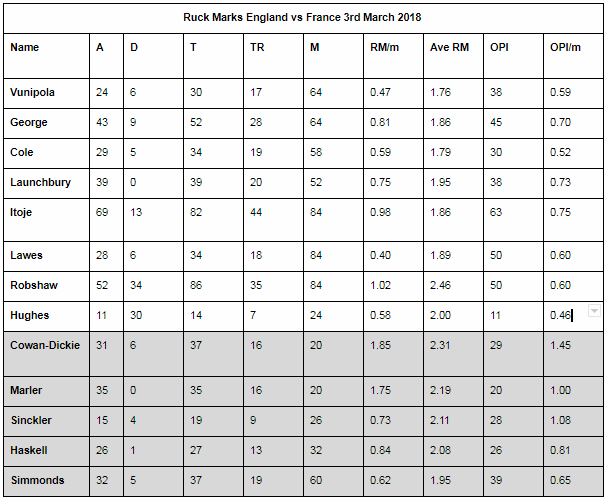With England's struggles at the breakdown the current focus for discussion, I decided to undertake an analysis of their rucks during the England vs France Six Nations Match.
I decided to base my analysis on the Ruck scoring method originally designed by the brilliant Demented Mole blog, linked here: https://dementedmole.com/2013/10/30/ruck-marks/ I mean why re-invent the wheel?
In an attempt to get away from the almost meaningless Meters Carried stat, I wanted to score carries. So I thought it worth first clarifying what we'll class as a carry. I've opted for the following:
- No – 2 steps forwards, a mile away from the defence and a pass.
- Yes – Getting to a defender and either beating him or getting tackled.
- Yes – A clean break through the defensive line (and no one quite lays a hand on you).
The scoring follows as such:
- A carry, but taken behind the gainline and taken down fast. 1 mark is to show that at least you're offering yourself for work.
- Reach the gainline basically, get taken down quickly, or taken behind the gainline but hold your feet for long enough for support to arrive.
- Either bend the gainline before going down, reach the gainline but into a good body position (long reach placement to make it harder to turn over and give quicker cleaner ball), reach the gainline but hold your feet for enough time for good support to arrive.
- Make solid yards past the gainline, normally going to take a defender being beaten (but not essential and not important to the scoring). Make it harder for a counter ruck to the speed of the ball available and being on the front foot.
- Clean break, either a great running line or great attacking work to beat defenders to make the break.
Key points to remember.
- In phase play, we're looking for the gainline basically.
- on kick return a good running return would effectively replace the word gainline for the first contact,
- a one indicates where a player is knocked back by the tackler, rather than going forwards (even if they then get dragged back a little).
- Set piece play would also need to be classed as the first contact, but it's a trickier aspect to judge.
A = Attacking Ruck D = Defensive Ruck T = Total Ruck Marks TR = Total Rucks M = Minutes RM = Ruck marks OPI = Overall Positive Interactions (total rucks, tackles, carries, defenders beaten, minus missed tackles, penalties, turnovers etc)
* Lineout data not included.
Notes:
- On average you'd expect average RM to be around 2 for a decent performance, much lower and there are issues.
- OPI does not include lineouts taken or stolen, that would boost some players scores, and rightly so.
- Nor does it include scrums, which will drain front row and locks more than others.
Interpreting the stats
All in all, England's breakdown just isn't good enough.
With 116 attacking rucks, England was first to the breakdown around 61 times, that means approx 50% of the time a Frenchman was at the ruck before England’s players. That coupled with relatively poor clearouts, often requiring multiple cleaners to remove a single threat, we saw England's game plan of utilising quick and lightly resourced rucks fall down.
In contrast to the first half, there was a significant change of England's attitude towards opposition rucks during the second half with regards. Suddenly the English were targeting them with newfound intensity, not necessarily very well for the most part, but it was there and I think it made a difference.
If England wants to play with the pace they desire they’ll do well to continue that.
Some notes:
- I believe England would be better playing Lawes at lock. For me, he's simply not active enough in the breakdown to be a blindside and I feel England would benefit from a more traditional blindside to increase their efforts at the breakdown and balance out any reduction in work rate occurring from that move. I believe Lawes best contribution is when he is introduced 55/60, when replacements are full of energy..
- Looking at the stats, Itoje had a huge game all round which is far from in keeping with the general feeling that Itoje is not playing well – it seems his role within the team has changed significantly and as such his visibility has diminished. This is in keeping with Alex Sanderson's comments recently.
- Simmonds needs to work in wider spaces, I don't think he suits England at 8, but even with a slow start in the first half, I'd still like to see him at 7, I don't think his clearouts are that good, but he has the pace to be the first man, which makes it less of an important issue. Obviously, with no Hughes or BV, it's not really an option but potentially a thought for the future?
- England's replacements bring real energy in the carry and clearout department. Does that mean they should start? Perhaps in some cases, but I don't think it's usually fair to compare someone who knows they've only got a limited amount of time to someone who’s grafted for 50-60 minutes. Chances are they will always produce a more energetic performance.
- I personally think George put his hand up well. Maybe not much of the more visible stuff we see from him later in a game, but certainly, a very solid performance that doesn't compare badly to Hartley's work rate in the ruck or tackle looked more energetic to me.
- When England generate quick front foot ball I think their attack can look very sharp, and if allowed to play the way they want, very dangerous. Unfortunately for England teams aren't just going to lie down and let them.
- If they are overtraining and tired as has been suggested, then it'll come good, if not, they are in trouble and need to adapt their play.
- I'd personally opt to bring Joseph back in, I don't think Teo added much, and for me, Joseph has better hands and defence.
Full Breakdown:
1st Half
Attack:
- Vunipola: 1,2,1,1,1,2,3,2,2,2,2 11/19
- George 3,1,3,2,2,1,2,1,2,1,2,1,2,2,2 15/27
- Cole 2,4,2,2,1,2,2,2,1,1,2,1 12/22
- Launch 3,2,2,1,1,2,1,2,3,1,2,3,3,2,2 15/30
- Itoje 2,2,2,1,2,2,2,2,2,2,1,2,2,2,3,1,2,2,2,1,2 21/39
- Lawes 1,2,2,2,1,2,2 7/12
- Robshaw 2,1,2,2,2,2,2,1,2,2 10/18
- Hughes 2,2,1,2,2,2 6/11
- Care 3
- Ford 3
- Daly 2,2
- Farrell 2,1,2,2,3,3,2
- Teo 3,2,2,2,2,2
- May
- Watson 3,2,2,1,2
- LCD
- Marler
- Sinckler
- Haskell
- Simmonds 2,2 2/4
- Wiggles
- Joseph
- Brown
Defence:
- Mako 3 1/3
- George
- Cole 2 1/2
- Launch
- Itoje 2 1/2
- Lawes 1 1/1
- Robshaw 3,2,5 3/10
- Hughes 3 1/3
- Care
- Ford
- Daly
- Farrell
- Teo
- May
- Watson
- LCD
- Marler
- Sinckler
- Haskell
- Simmonds
- Wigglesworth
- Joseph
- Brown
First man;
Vunipola 1,1,1 George 1,1,1,1,1,1 Cole 1,1 Launch 1,1,1,1 Itoje 1,1,1,1 Lawes 1,1,1 Robshaw 1 Hughes 1,1 Care Ford Daly Farrell 1 Teo 1,1,1 May Watson LCD Marler Sinckler Haskell Simmonds 1 Wiggles Joseph Brown
Forwards carries:
Vunipola 3,2,3,1 George 1* Cole Launch 1,1,3,2,1 Itoje 3,2 Lawes 2,2,1,2,3,2,1 Robshaw 2,1,3,2,1,3,2 Hughes 3,3,3 LCD Marler Sinckler Haskell Simmonds 2
2nd half
Attack:
- Vunipola 2,1,2 3/5
- George 2,2,2,1,3,1,2,2,1 9/16
- Cole 1,2,2,2 4/7
- Launchburry 2,2,2,2,1 5/9
- Itoje 2,2,3,1,1,2,2,1,2,2,2,2,2,2,2,2 16/30
- Lawes 1,1,2,2,3,2,2,3 8/16
- Robshaw 4,2,4,2,2,2,2,2,2,2,4,2,2,2 14/34
- Hughes
- Care
- Ford 2,2,1,1
- Daly 2,2,2
- Farrell 3,1,2,1,2
- Teo 2,1,2,2,2,2
- May
- Watson 2,1,2,2 LCD 2,2,3,2,2,2,3,4,2,2,1,3,1,2 14/31
- Marler 2,3,1,1,4,2,2,2,1,1,1,3,3,2,4,3 16/35
- Sinckler 3,3,1,2,2,2,2 7/15
- Haskell 2,3,2,1,2,2,2,2,2,3,2,3 12/26
- Simmonds 2,2,2,2,3,2,2,2,1,2,2,2,2,2 14/28
- Wiggles 2,2
- Joseph 2,3,1,2
- Brown 2,2,2,2
Defence:
- Vunipola 2,1 2/3
- George 2,2,3,2 4/9
- Cole 1,2 2/3
- Launchburry
- Itoje 3,2,1,2,2,1 6/11
- Lawes 3,2 2/5
- Robshaw 3,5,2,1,5,5,2,1 8/24
- Hughes
- Care
- Ford 1
- Daly
- Farrell 1
- Teo 1
- May 3
- Watson
- LCD 3,3 2/6
- Marler 0/0
- Sinckler 2,2 2/4
- Haskell 1 1/1
- Simmonds 2,2,1 3/5
- Wigglesworth
- Joseph 2
- Brown
First man:
Vunipola 1 George 1,1 Cole Launch 1,1,1 Itoje 1,1,1,1 Lawes Robshaw 1,1,1 Hughes Care Ford Daly Farrell Teo 1,1 May Watson LCD 1,1,1 Marler 1,1,1,1 Sinckler 1,1,1 Haskell 1,1 Simmonds 1,1,1 Wiggles Joseph Brown 1
Forwards carries:
Vunipola 3,2 George 1 Cole 3,1 Launch 3,1 Itoje 2,2,3,3 Lawes 2,2,2,3 Robshaw 3,2,3 Hughes LCD 4,1,4,2,2 Marler 4 Sinckler 4,3,2,2,3,2,4,4 Haskell 4,2,2,3,3,4,2 Simmonds 2,1,2,1,3,1,2,2
About the Author:
An interested amateur when it comes to analysis, Karl is a Wasps and England supporter. You can find him on twitter at the handle: Raggs
*this is an abriged version of analysis first appeared on the Rugby Rebels forum. The original complete with additional data and detailed thoughts can be found here.
Author: The Dead Ball Area





